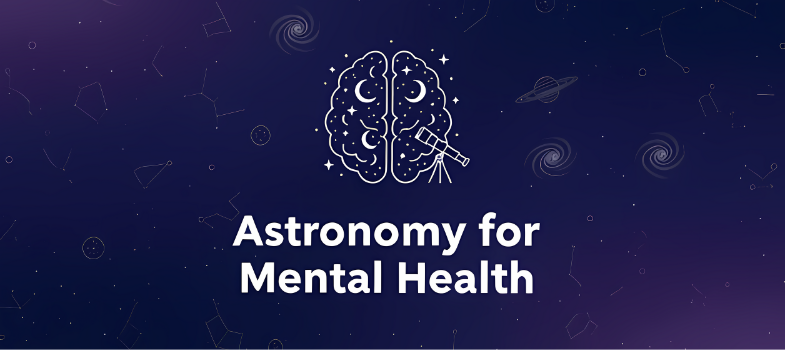Blueprint: Astronomy for Mental Health and Well-Being Online Session Example
This one-hour online session combines astronomy storytelling with simple well-being practices to create a safe, engaging, and reflective experience. Using narratives from the Office of Astronomy for Development, participants are guided through grounding exercises, inspiring cosmic stories, personal values reflection, and small action steps for daily life. The session fosters awe, connection, and meaning while incorporating Acceptance and Commitment Therapy principles in a non-therapeutic way.
Duration: 60 minutes
Mode: Virtual (Zoom, Teams, or similar)
Facilitators: Lead facilitator and well-being focal person
Session Journey
1. Welcome and Orientation (5 minutes)
Purpose: Build safety and connection.
- Greet participants and introduce facilitators
- Share session norms: opt-out at any time, one voice at a time, respect privacy
- Give a short content notice:
- “The night sky can stir feelings of awe, curiosity, and sometimes difficult emotions. You are free to participate in ways that feel right for you, including stepping back if needed.”
- Optional quick poll: How connected do you feel right now on a scale of 0 to 10?
2. Grounding Exercise (5 minutes)
Purpose: Help participants settle into the present moment.
- Guide sensory grounding: notice three things you see, three things you hear, three things you feel
- End with: “Bring your attention to the space around you, and carry this awareness as we begin.”
3. Astronomy Narrative (10 minutes)
Purpose: Inspire awe and create perspective.
- Share a short story from the OAD Narratives Reference Booklet (for example Earthrise or a constellation story)
- Show an image such as the Milky Way or Earth from space
- Pause for 30 seconds of silence
- Invite participants to write one word in chat that captures how they feel
4. Values Reflection (10 minutes)
Purpose: Connect astronomy narrative to personal meaning.
- Prompt: “When you look up at the night sky, what matters most to you in that moment? What values or ideals come to mind?”
- Give participants two to three minutes to write their reflections privately
- Optional sharing: invite one word or phrase in chat or small pair breakout
5. Action Step (5 minutes)
Purpose: Translate values into practical commitments.
- Prompt: “What is one small action you could take this week to connect more deeply with the night sky and your well-being? For example, spend five minutes stargazing, share a sky photo, or write a short journal note.”
- Ask participants to write their action step down
6. Mood and Connection Check (5 minutes)
Purpose: Light evaluation and reflection.
- Quick poll: mood, stress, connectedness (scale 0 to 10)
- Ask: “What shifted for you since the beginning?”
7. Peer Exchange (10 minutes)
Purpose: Strengthen social connection.
- Break participants into groups of three to four
- Prompt: “What stood out for you in today’s narrative or reflection? What might help you carry your action step forward?”
- Return to plenary after discussion
8. Closing and Feedback (5 minutes)
Purpose: End with clarity and support.
- Summarize key takeaways: awe, values, small action
- Share support resources (helplines, community contacts)
- Feedback poll: “What was most helpful today?”
- Chat prompt: “What would you like to see more of next time?”
Thank participants and close: “The night sky belongs to all of us. Carry a piece of it with you this week.”
Facilitator Checklist
Before Session
- Select narrative from OAD Narratives booklet
- Choose image or visuals
- Prepare polls for mood, stress, connection, and feedback
- Script grounding and reflection prompts
- Set up breakout rooms
- Prepare support resources list
During Session
- Deliver welcome, content notice, and norms
- Run grounding exercise
- Share narrative and image with pauses
- Guide values reflection and action step
- Run polls and monitor chat for well-being
- Well-being focal person available to support participants privately if needed
After Session
- Debrief with co-facilitator
- Record attendance and feedback
- Share summary and support links with participants
Design Principles
- Session flow: grounding → awe → reflection → action → sharing → closure
- Micro-engagements: polls, chat prompts, breakout discussions
- Accessibility: plain language, inclusive instructions, opt-outs always available
- ACT principles: values reflection, grounding, small committed actions (not therapy)
- OAD narratives: cultural and human-centered stories as the heart of the session
